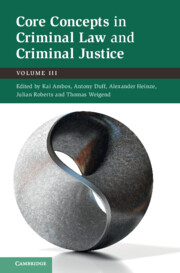Refine search
Actions for selected content:
28 results
Unsoundness of Mind and Neurological Impairments: A Reappraisal of Section 22 of the Bharatiya Nyaya Sanhita, 2023
-
- Journal:
- International Annals of Criminology , First View
- Published online by Cambridge University Press:
- 27 August 2025, pp. 1-27
-
- Article
- Export citation

Core Concepts in Criminal Law and Criminal Justice
- Volume III
-
- Published online:
- 09 July 2025
- Print publication:
- 24 July 2025
9 - Defences to Genocide
-
- Book:
- Genocide in International Law
- Published online:
- 14 March 2025
- Print publication:
- 03 April 2025, pp 429-462
-
- Chapter
- Export citation
2 - Undercover Authors
-
- Book:
- Undercover
- Published online:
- 13 March 2025
- Print publication:
- 20 March 2025, pp 64-96
-
- Chapter
- Export citation
4.9 - The Madman
- from History 4 - Heroes
-
-
- Book:
- The New Cambridge History of Russian Literature
- Published online:
- 31 December 2024
- Print publication:
- 12 December 2024, pp 824-841
-
- Chapter
- Export citation
Medical Aspects of Crime by Sir William Norwood East, 1936
- Part of
-
- Journal:
- BJPsych Advances / Volume 30 / Issue 6 / November 2024
- Published online by Cambridge University Press:
- 27 May 2024, pp. 425-427
- Print publication:
- November 2024
-
- Article
-
- You have access
- Open access
- HTML
- Export citation
25 - Decisions Regarding Insanity
- from Part III - Trial Phase Decision-Making
-
-
- Book:
- The Cambridge Handbook of Psychology and Legal Decision-Making
- Published online:
- 22 February 2024
- Print publication:
- 29 February 2024, pp 379-394
-
- Chapter
- Export citation
18 - Clinical Decision-Making Regarding Criminal Responsibility
- from Part II - Pretrial Phase Decision-Making
-
-
- Book:
- The Cambridge Handbook of Psychology and Legal Decision-Making
- Published online:
- 22 February 2024
- Print publication:
- 29 February 2024, pp 274-289
-
- Chapter
- Export citation
2 - Enumerating Insanity
- from Part I
-
- Book:
- Mandatory Madness
- Published online:
- 16 November 2023
- Print publication:
- 30 November 2023, pp 81-116
-
- Chapter
- Export citation
12 - Holmes’s “Medicated Novels”
-
- Book:
- Mark Twain, Dr. Oliver Wendell Holmes, and the Head Readers
- Published online:
- 17 April 2023
- Print publication:
- 06 April 2023, pp 245-256
-
- Chapter
- Export citation
14 - Phrenology Assessed
-
- Book:
- Mark Twain, Dr. Oliver Wendell Holmes, and the Head Readers
- Published online:
- 17 April 2023
- Print publication:
- 06 April 2023, pp 281-305
-
- Chapter
- Export citation
Chapter 3 - States of Brain and Mind
- from Part I - The Factors That Underlie Lust Killing
-
- Book:
- Understanding Sexual Serial Killing
- Published online:
- 26 May 2022
- Print publication:
- 02 June 2022, pp 25-39
-
- Chapter
- Export citation
9 - Hearing Oneself as Another
- from Part IV - Hearing Others
-
- Book:
- Music, Subjectivity, and Schumann
- Published online:
- 07 April 2022
- Print publication:
- 07 April 2022, pp 302-332
-
- Chapter
- Export citation
8 - Prudence, Personhood, and Law in Renaissance Italy
-
- Book:
- Patrimony and Law in Renaissance Italy
- Published online:
- 24 February 2022
- Print publication:
- 03 March 2022, pp 200-221
-
- Chapter
- Export citation
Chapter 5 - The Begum’s Fortune
- from Part III - Adoption and Inheritance
-
- Book:
- Colonial Law in India and the Victorian Imagination
- Published online:
- 02 April 2021
- Print publication:
- 22 April 2021, pp 149-175
-
- Chapter
- Export citation
7 - Defences
-
- Book:
- Criminal Law Perspectives
- Published online:
- 19 February 2021
- Print publication:
- 03 December 2020, pp 420-488
-
- Chapter
- Export citation
2 - The Failings of the Law: The Cases of Talbot and Westmeath
-
- Book:
- Irish Divorce
- Published online:
- 16 January 2020
- Print publication:
- 06 February 2020, pp 44-62
-
- Chapter
- Export citation
Part II - Responsibility in Criminal Law
-
- Book:
- Self, Others and the State
- Published online:
- 11 November 2019
- Print publication:
- 12 December 2019, pp 73-162
-
- Chapter
- Export citation
4 - The ‘Birth’ of Australian Criminal Law
- from Part II - Responsibility in Criminal Law
-
- Book:
- Self, Others and the State
- Published online:
- 11 November 2019
- Print publication:
- 12 December 2019, pp 104-133
-
- Chapter
- Export citation
Chapter 8 - Defences to and remedies for trespass
-
- Book:
- Contemporary Australian Tort Law
- Published online:
- 20 January 2020
- Print publication:
- 15 October 2019, pp 316-359
-
- Chapter
- Export citation
